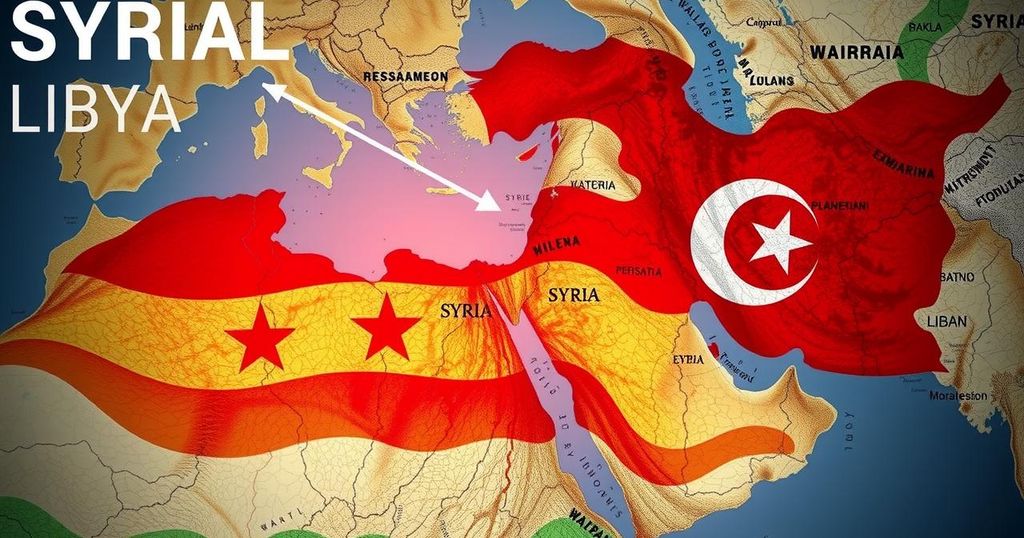Russia is transitioning its strategic interests from Syria to Libya following the fall of Damascus, revealing a deeper reliance on local figures like Khalifa Haftar. The Kremlin’s support highlights the fragility of these alliances as both Assad and Haftar grapple with external dependence on Russian military power. For the West, understanding these dynamics is essential to effectively counteract Russian influence and foster genuine stability in Libya.
The ongoing geopolitical shifts indicate Russia’s transition from Syria to Libya may be more than a mere relocation; it is a strategic recalibration. The fall of Damascus underscored the fragility of alliances built on coercion. For Moscow, although the loss of influence in Syria is significant, it presents new opportunities for expansion in the Mediterranean region, particularly through support for Khalifa Haftar in Libya. This shift not only aligns with Russia’s historical aspirations to challenge Western dominance but also reveals the continuing reliance of figures like Assad and Haftar on external power for survival.
Moscow’s operations in Syria were not solely about maintaining control but were integral in resisting Western encroachment and securing substantial strategic footholds. The evolution of Russia’s role in Libya is emblematic of a longstanding desire for a Mediterranean presence dating back centuries. Both Assad and Haftar mirror transactional relationships with Russia, and their apparent strengths mask vulnerabilities. Washington’s attempts to reorient Haftar away from Moscow suffer from a misperception of both Haftar’s military dependency and the dynamics of international support.
The Kremlin’s relationship with Haftar is a prime example of deep asymmetry where the general portrays his power through bravado, while in reality, he relies heavily on Russian military and logistical support. Moscow’s capacity to recalibrate military assistance stands as a potential threat to Haftar’s claims of independence. This duality—of seeking familial and local control while depending on external backers—echoes the trajectory of past leaders like Gaddafi and Assad, who faced calamitous declines when their reliance on outside powers grew.
Moreover, the approach of the Haftar family to evade sanctions and extract economic advantage highlights the intricate and often corrupt nature of Libyan governance. The fragmentation of Libya’s political structure enables figures like Haftar to capitalize on foreign relations, intertwining power with dependency and financial exploitation. Consequently, assumptions of Haftar’s agency in the geopolitical landscape underestimate the complexities of alliances.
If the West aims to counteract Moscow’s influence, it must recognize the limitations of pursuing fleeting alliances reliant on figures such as Haftar. A more structural response that addresses the underlying vulnerabilities of Libya would serve better than mere attempts to sway individual actors. Sustained Western support for internal reforms, economic resilience, and governance is essential to counteract external exploitation and promote genuine stability. Ultimately, the West must learn from past interventions—the consequences of neglecting early, coherent strategies may not just reverberate regionally but may influence broader global power dynamics.
The backdrop of this analysis involves Russia’s shifting strategy in the context of its foreign policy achievements and failures. The recent events in Syria, particularly with the fading influence of Bashar al-Assad despite Moscow’s military backing, illustrate the potential fragility of such alliances. In the face of these changes, Russia now seeks to assert its influence in North Africa, particularly in Libya, indicating a desire for a more dominant role in the Mediterranean. Historical ambitions and strategic interests imply a continuity of Moscow’s objectives across different regions, making this shift integral to understanding Russia’s broader geopolitical endeavors.
In conclusion, the analysis reveals that Russia’s pivoting from Syria to Libya reflects a complex strategy embedded within historical pursuits for Mediterranean dominance. The interdependence of local leaders like Haftar on Russian support underscores the fragility of their perceived autonomy. For Western nations, recognizing these dynamics is crucial; they must focus on fostering resilient governance in Libya rather than relying on unstable alliances. Ultimately, learning from the past can better prepare the West for future engagements in the region.
Original Source: www.atlanticcouncil.org






